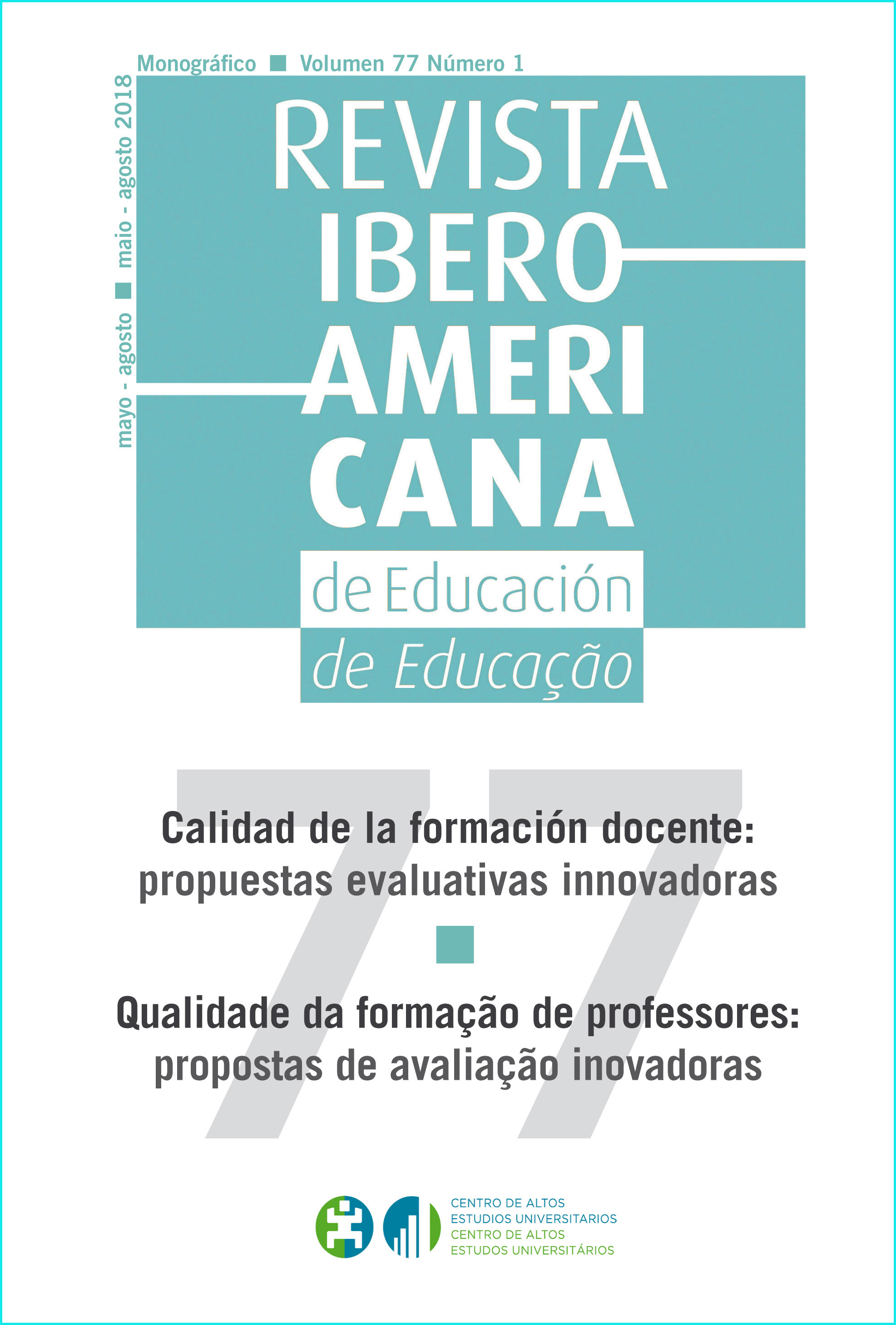La Interfaz arte-ciencia-cultura como forma de innovar la formación inicial de profesores de Física
DOI:
https://doi.org/10.35362/rie7713079Palabras clave:
investigación curricular; formación de profesores; enseñanza secundaria; ciencias de la naturaleza.Resumen
Muchas son las posibilidades para la promoción de innovaciones en la formación inicial de profesores, pero pocas acciones efectivamente se han concretado en la práctica en el aula de la Educación Básica. El objetivo de este trabajo es contribuir con la formación inicial de profesores de Física, al presentar y discutir una propuesta pedagógica innovadora, en la perspectiva del desarrollo profesional docente, en el contexto del curso de Licenciatura en Física de la Universidad Federal del Triângulo Mineiro (UFTM), Minas Gerais, Brasil. Se trabajó específicamente en las disciplinas obligatorias "Instrumentación para la Enseñanza de Física" (IEF) y "Orientación y Pasantía Curricular Supervisada IV" (ECS IV). Se socializan los trabajos desarrollados en diferentes temas de la Física, vinculándolos a la tríada arte-ciencia-cultura, en un abordaje evaluativo no fragmentado y fomentado por acciones interdisciplinares y contextualizadas, con la finalidad de maximizar la actuación del futuro profesor de la disciplina, con un sesgo de innovación curricular, en ámbito evaluativo y metodológico. Se buscó la elaboración y aplicación de un objeto educativo como forma de evaluación de las acciones de los futuros profesores, en la intersección entre las disciplinas de IEF y ECS IV, en la cual las temáticas discutidas en IEF fomentaron la aplicación en el aula en ECS IV. Se concluye que las acciones propuestas se concretar íntegramente, proporcionando nuevas vivencias a los licenciandos en relación a los conceptos trabajados en la Universidad y culminando en innovaciones de naturaleza metodológica, curricular y evaluativa en el aula de la Educación Básica, por medio de nuevos ropajes para temas tradicionales de la Física.
Descargas
Citas
Araujo, M. S. T. & Abib, M. L. V. S. (2003). Atividades Experimentais no Ensino de Física: Diferentes Enfoques, Diferentes Finalidades. Revista Brasileira de Ensino de Física. 25(2), 176-194.
Barbosa, A. S. M., Passos, C. M. B. & Coelho, A. A. (2011). O cordel como recurso didático no ensino de ciências. Experiências em Ensino de Ciências, 6(2), 161-168.
Bolívar, A. (2016). ¿Cómo puede la evaluación institucional contribuir para mejorar la escuela? Estudos em Avaliação Educacional, São Paulo, 27(65), 284-313.
Brasil (1996). Lei de Diretrizes e Bases da Educação. Lei nº 9394/96, de 20 de dezembro de 1996. Ministério da Educação. Brasília: MEC. Recuperado de: http://www.planalto.gov.br/Ccivil_03/leis/L9394.htm
Brasil (2002). Orientações Educacionais Complementares aos Parâmetros Curriculares Nacionais. PCN+ Ensino Médio. Ministério da Educação. Brasília: MEC. Recuperado de: http://portal.mec.gov.br/seb/arquivos/pdf/book_volume_02_internet.pdf
Canário, R. (2002). Formação inicial de professores: que futuro(s)? In: Afonso, N. & Canário, R. Estudos sobre a situação da formação inicial de professores. Porto: Porto Ed., 37-63.
Carvalho, A. M. P. (2013). Ensino de Ciências e a proposição de sequências de ensino investigativas. In: Carvalho, A. M. P. (Org.). Ensino de Ciências por Investigação. 1ª ed. São Paulo: Cengage Learning.
Ferreira, M. (2013). Como usar a música na sala de aula. São Paulo: Contexto, 8ª ed., 238p.
Fortunato, I. (2017). Entrevista com Francisco Imbernón. Revista Internacional de Formação de Professores (RIFP), Itapetininga, 2(2), 184-188.
Gallego Dominguez, C. & Marcelo Garcia, C. (2018). ¿Quién soy yo como maestro? Construcción de la identidad profesional en docentes principiantes. Identidad profesional docente. Narcea, p. 46-61.
Hargreaves, A. (2016). The place for professional capital and community. Journal of Professional Capital and Community, 1(1). Recuperado de: https://doi.org/10.1108/JPCC-11-2015-0010
Laville, C; Dionne, J. (1999). A construção do saber: manual de pesquisa em ciências humanas. Porto Alegre: Editora Artes Médicas.
Mazur, E. & Watkins, J. (2009). Just-in-Time Teaching and Peer Instruction. Getting Started with Just-in-Time Teaching. Recuperado de: http://www.stat.columbia.edu/~gelman/communication/WatkinsMazur2009.pdf
Medeiros, Z. (2016). Entrevista com Manuela Esteves. Revista Docência Ensino Superior, 6(2), 275-288. Recuperado de: https://seer.ufmg.br/index.php/rdes/article/view/3726/2757
Moreira, M. A. (1998). Mapas conceituais e aprendizagem significativa. Cadernos de Aplicação, Porto Alegre, 11(2), 143-156.
Moreira, A. F. B. & Ramos, R. K. (2016). Mobilidade educacional e a internacionalização dos estudos curriculares. Revista Teias (UERJ. Online), 17(45), 163-175, 2016.
Morgado, J. C. (2011). Identidade e profissionalidade docente: sentidos e (im)possibilidades. Ensaio, Rio de Janeiro, 19(73), 793-812.
Munford, D. & Lima, M. E. (2007). Ensinar ciências por investigação: em quê estamos de acordo? Revista Ensaio Pesquisa em Educação em Ciências. 9(1), 72-89.
Napolitano, M. (2013). Como usar o cinema na sala de aula. São Paulo: Contexto, 5ª ed., 251p.
Pacheco, J. A (2016). Para a noção de transformação curricular. Cadernos de Pesquisa, 46(159), 64-77.
Piassi, L. P. & Pietrocola, M. (2009). Ficção científica e ensino de ciências: para além do método de encontrar erros em filmes. Educação e Pesquisa, São Paulo, 35(3), 525-540.
PPC/Física/UFTM (2010). Projeto Pedagógico Curso de Graduação em Física – Licenciatura. Universidade Federal do Triângulo Mineiro. Uberaba, Brasil. Recuperado de: http://www.uftm.edu.br/fisica/projeto-pedagogico
Roldão, M. C. (2017). Conhecimento, didáctica e compromisso: o triângulo virtuoso de uma profissionalidade em risco. Cadernos de Pesquisa, 47(166), 1134-1149.
Cómo citar
Descargas
Publicado
Número
Sección
Licencia
Aquellos autores/as que tengan publicaciones con esta revista, aceptan los términos siguientes:
















